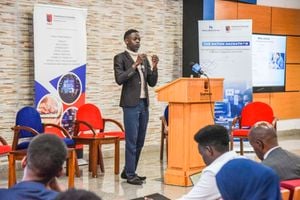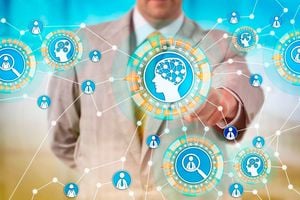
The world of AI is also heavily lopsided in favour of the North.
Like it happened during the first, second and third industrial revolutions, the fourth wave of global industrialisation appears to be a race to the bottom for Kenya, Africa and other developing countries in the Global South.
The more than 140 low-to-middle-income countries in Africa, Asia, Latin America, the Caribbean and Oceania are not only lagging behind in the formulation, development, adoption, deployment and regulation of artificial intelligence but also appear booked for the negative consequences of the roaring Fourth Industrial Revolution in the Global North.
A recent assessment of 188 countries around the world and their preparedness in using AI in public services reveals that sub-Saharan Africa is the lowest-scoring region, followed by its peers in the Caribbean, Latin America, Oceania, and central and south Asia.
For four years in a row, the 2024 Government AI Readiness Index by Oxford Insights, a consultancy firm that advises organisations and governments on matters digital transformation, ranks the US, the UK, Singapore and their Global North peers in the top 10 slots.
In sub-Saharan Africa, Kenya is ranked sixth in the research that focused on adoption of AI in government services, tech, data and infrastructure— behind Mauritius, South Africa, Rwanda, Senegal and Seychelles.
“Sub-Saharan Africa shows emerging progress in AI readiness, with Mauritius (53.94), South Africa (52.91), and Rwanda (51.25) leading the region. These countries stand out as front-runners, with clear momentum in strengthening their AI ecosystems,” says the report in which Nairobi has an overall score of 44.2 out of 100.
Heavily lopsided
The world of AI is also heavily lopsided in favour of the North. Of the world’s 109 most important machine learning models, only two were developed in a Global South country— Egypt. A staggering 101 were made in the US, western Europe, or China. At the same time, one American firm, Nvidia, holds as much as 95 percent of the global AI chip market. The $335 billion private capital invested in American AI companies from 2013-2023 was three times more than in China, 11 times more than in the UK, 30 times more than in India, and hundred-times more than the entire sub-Saharan Africa.
A similar imbalance exists in AI policy formulation and governance. The policies, standards, guidelines, and rules shaping the development, deployment and regulation of AI overwhelmingly originate in the rich world, with some developing nations tweaking and adopting them without considering their local contexts, needs and use cases. A recent review done by New America and the Igarape Institute for the G20 found that out of nearly 500 AI policies, standards, and guidelines developed between 2011 and 2023, two-thirds originated in the US, Europe, or China, while only seven percent came from Latin America and Africa.
This inequality in AI rule-setting partly explains why the technology’s path has been tracing national, territorial, commercial, and social interests of wealthy nations— at times to the detriment of societies with less power and fewer resources in the Global South. Without a bigger say and more AI policymaking capacity, billions of people in developing countries are more likely to be exposed to risks and deprived of benefits of AI.
The low investment and limited latitude in AI governance has, for instance, seen Kenya, Africa and their peers in Asia, the Caribbean, South America and Oceania reaping fringe benefits of the revolutionary technology that is set to change life, work and business (as we know it today) forever.
A 2017 projection by PwC on the value AI would bring to national economies and global gross domestic product shows that by 2030, AI will contribute $15.7 trillion to the global economy. PwC estimates that North America, Europe and China will bag 84 percent of the windfall, with the rest of the world scrambling to get a share of the remainder. According to the seminal report titled Sizing the Prize, three percent of the AI proceeds will go to Latin America, six percent to developed Asia, and eight percent for Africa, Oceania and other Asian markets.
World Economic Forum
Looking forward, it appears the situation will only get worse if nothing is done to reverse this trend. When the World Economic Forum surveyed more than 60 chief economists at the end of 2023, nearly all said AI would improve productivity in high-income countries in the next five years. Only a half predicted AI would improve productivity in low-income countries, and six out of 10 anticipated AI would widen the divide between the Global North and South.
While the would-be benefits of 4IR are a distant dream for the developing economies, a dark cloud of negative impacts of the mass adoption and exploitation of AI, cloud computing, robotics, internet of things, big data, augmented and virtual reality in the North is already gathering over the skies in the South.
For a record fifth time (when you include Agrarian Revolution), a painful and irreversible history— charaterised by exclusion, runaway digital divide, systemic inequalities, and wanton exploitation natural and human resources (at low or zero benefit to Global South)— is bound to repeat itself.
The developing world is on the back foot because successful development, deployment and exploitation of AI and other 4IR technologies on a scaled level requires multi-billion-dollar investments in computing power, talent, technical infrastructure, models, tools, data, and capacity in addition to enabling laws, policies and guidelines. Most of the low-to-mid-income economies lack the required wherewithal.
Take the example of compute, essential for creating AI technologies and applications. It is one of the world’s most expensive resources yet collectively, the Global South is home to just over one percent of the world’s top computers, and Africa just 0.04 percent. With the kind of computing capacity available in Africa, technology analysts say it would take hundreds of years to catch up with the advances that have been made with generative AI in the West and the developed East— Japan, Singapore, South Korea and Taiwan.
But as the Global South ponders on how to finance its 4IR journey, exhaust fumes from Global North’s AI trains are already ashore— including labour displacements, information disorders, political polarisation and destabilisation, and widening economic inequality.
AI-powered labour displacements, for instance, are already rendering millions of Asians and Africans jobless in continents that boast youthful but unemployed and under-employed populations, with Africa’s median age being 19. Increasingly, employers are realizing that machines are cheaper than humans, sparking redundancies and layoffs for easily automatable roles yet the cheap labour that was once offshored to their lands is now being onshored back to the Global North.
Generative AI technologies such as Open AI’s ChatGPT-4 and Google’s Gemini are also threatening the rising middle class in developing countries, with a recent World Bank report estimating that up to five percent of jobs are at risk of full automation in Latin America and the Caribbean.
The widening digital divide between the Global North and South calls for urgent, systematic and concerted efforts to mind and narrow the gap because the above negative impacts of this revolution is no respecter of class, race or territorial boundaries.
The climate change crisis, pandemics, political and economic instability, and information disorders have reminded the rich world that the problems they create for the globe in their selfish pursuit of prosperity will ultimately return to haunt them at home. AI-triggered labour displacements and mass migrations wrought by the climate crisis in Africa, Asia and the Caribbean will soon see a return of the illegal immigrants’ crisis, even on a larger scale, for the Global North.
Tech giants
Political and economic leaders, including tech giants and research institutions, in both worlds need to convene meetings of minds and money to help the Global South get on a sound footing in its 4IR journey.
And Africa has an opportunity: In November this year, the Group of Twenty (G20), an international forum of both developing and developed countries, which seeks to find solutions to global economic and financial issues, is set to converge on Johannesburg. African leaders should use this summit, which represents more than 80 percent of global GDP, to draw global attention to their situation.
In the wake of the 2008 financial crisis, G20 finance ministers gathered in Washington DC and figured out how to mitigate risk in the global financial system. Today, Global South ministers responsible for matters digital economy and industrialisation could gather in a similar way to discuss how to build global cooperation and collaboration that can turbocharge their 4IR take-off.
They could push for the creation of global initiatives for the development, deployment and regulation of AI and other 4IR priorities of the majority world. They could, for instance, champion the establishment of Equitable AI Development Forum, in which countries, industry, researchers, tech giants, and philanthropists could come together to develop and strengthen AI ecosystems and policies in the Global South.
The developed world and their tech behemoths, including the Big Five, should also provide greater financial and technological support to the developing world in the AI revolution. This support should be more structured, and sustainable to create significant and lasting benefits for all.
Besides pouring in dollars, Google, Apple, Meta and co., could also grant researchers and developers in developing countries greater access to their reusable models and tools to help accelerate AI research and development. Foundation models trained using unlabelled data could easily be adapted to new downstream tasks and this will in turn fuel the development of new capabilities and deployment for new use cases.
The AI revolution is not social media. It is a light-bulb moment, and we cannot afford to leave the Global South (or any other group) behind if we are to build a safer, more secure, more prosperous, and more equal world.
Harry Misiko, a Chevening and Journalism AI Scholar (UK), is the Lead Editor, News Desk, at the Nation Media Group in Nairobi.












